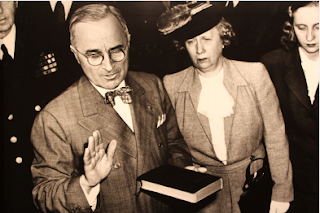Harry S. Truman was born in Lamar, Missouri on May 8th, 1884. His father, John Anderson Truman, was a farmer and mule trader. John and his wife, Martha Ellen Truman, had three children, of which Harry was the first. His first name was intended to honor his maternal uncle, and, interestingly, he wasn't given a full middle name. His parents only gave him the middle initial "S", which was intended to honor both his grandfathers.
Truman was an outstanding student and a voracious reader. By the time he was 18, he had read every book in the Independence Library. However, lack of personal funds meant that he was unable to pursue higher education. Truman was the only president of the 20th century to not have a college degree. In spite of this, he was considered a well-educated man and an especially knowledgeable student of history. He once said, "Not all readers are leaders, but all leaders are readers." Truman used history to his advantage by studying the biographies of great men and women, and using what he learned from their experiences to deal with challenges in his own life.
At the start of World War II, Truman volunteered, even though he was, at age 33, above the draft age limit. He was well-respected and was soon promoted to captain. While serving as captain in the army, he utilized methods that he had read about in Ulysses S. Grant's biography in order to effectively manage and lead his men.
Within a month of his homecoming from the war in May 1919, Truman was married to his childhood sweetheart, Elizabeth "Bess" Wallace. That same year he and an associate went into business, opening a haberdashery in Kansas City. But, within three years, the business had failed and the Great Depression had begun. This left him owing $20,000 -- a debt that he would spend the next 15 years working to repay. Bess gave birth to their only child, Mary Margaret, in 1924.
In 1922, Truman was elected as a judge of the Jackson County Court. He was defeated when he ran for a second term, but was then elected as presiding judge in 1926. He stayed at this position until 1934, when he was elected to the United States Senate. There, he earned a reputation as a man of honesty and integrity. Truman was also known for always having a neat, put-together appearance. During his time as Senator, he was listed as one of the ten best-dressed men in the Senate.
In 1944, he was nominated to run for Vice President on the Democratic ticket. He and Franklin Delano Roosevelt won the election and were sworn in in January of 1945. Less than three months later, after the death of FDR, Truman became the 33rd President of the United States. He made many important foreign policy decisions during this term, and was reelected in 1948.
During his presidency, Truman was known to be an early riser; always awake by 5:30 in the morning. He read multiple newspapers every morning before taking his daily two-mile walk. He used this time to think to himself, and considered his "daily constitutional" an important part of each day.
After leaving office, Truman returned to Independence, Missouri, where he focused on writing and lecturing. At the time, there was no pension provided to former presidents in the U.S. Essentially the only income Truman had to live was his U.S. Army pension of $112.56 per month. Seeing how financially limited he was, Congress eventually gave him an allowance and in 1958 passed the Former Presidents Act to provide former presidents with a pension.
Harry S. Truman died on December 26th, 1972, at age 88. He was buried in Independence, in the courtyard of the Harry S. Truman Library, where where Bess would join him 10 years later.
***Truman's recommended reading list for success:
- Plutarch’s Lives
- Caesar’s Commentaries
- Benjamin Franklin’s Autobiography
- Gibbon’s Decline and Fall of the Roman Empire
- Bunker Bean
- Missouri’s Struggle for Statehood
- The Bible
- Plato’s Republic
- Shakespeare’s works, including the Sonnets
- The complete works of Robert Burns
- Childe Harold
- Fifteen Decisive Battles of the World
- Charles Beard’s An Economic Interpretation of the Constitution
Sources
"Harry S. Truman." Bio. A&E Television Networks, 2015. Web. 28 June 2015.
Palmer, Kerry. "The Leadership Genius of Harry Truman." All Things Leadership. N.p., 2 Jan. 2010. Web. 27 June 2015.
"Harry S. Truman Biography." Facts on President Harry S. Truman. Truman Little White House, n.d. Web. 28 June 2015.
"Plain Speaking." Harry S. Truman. Snopes.com, 18 May 2011. Web. 28 June 2015.
"Harry S. Truman." The White House: History and Grounds. The White House, n.d. Web. 28 June 2015.












